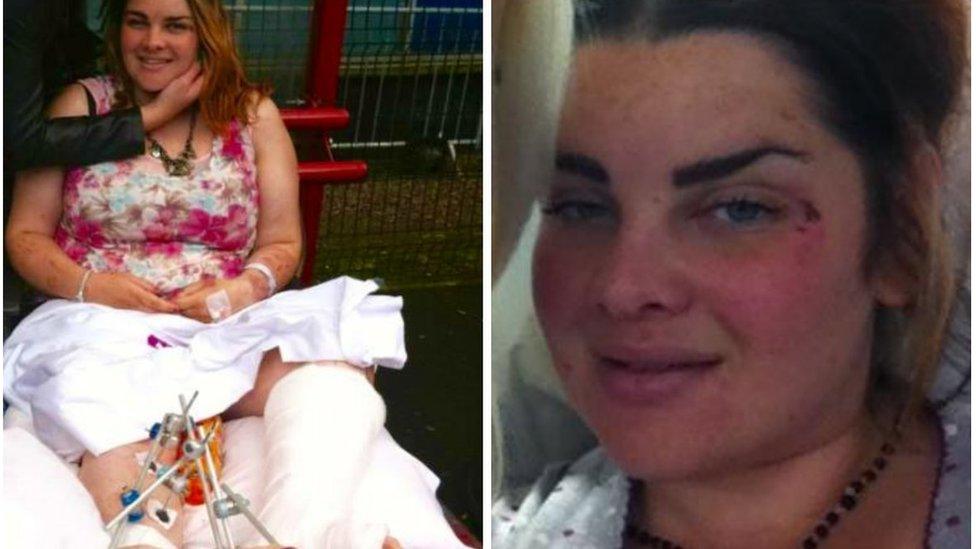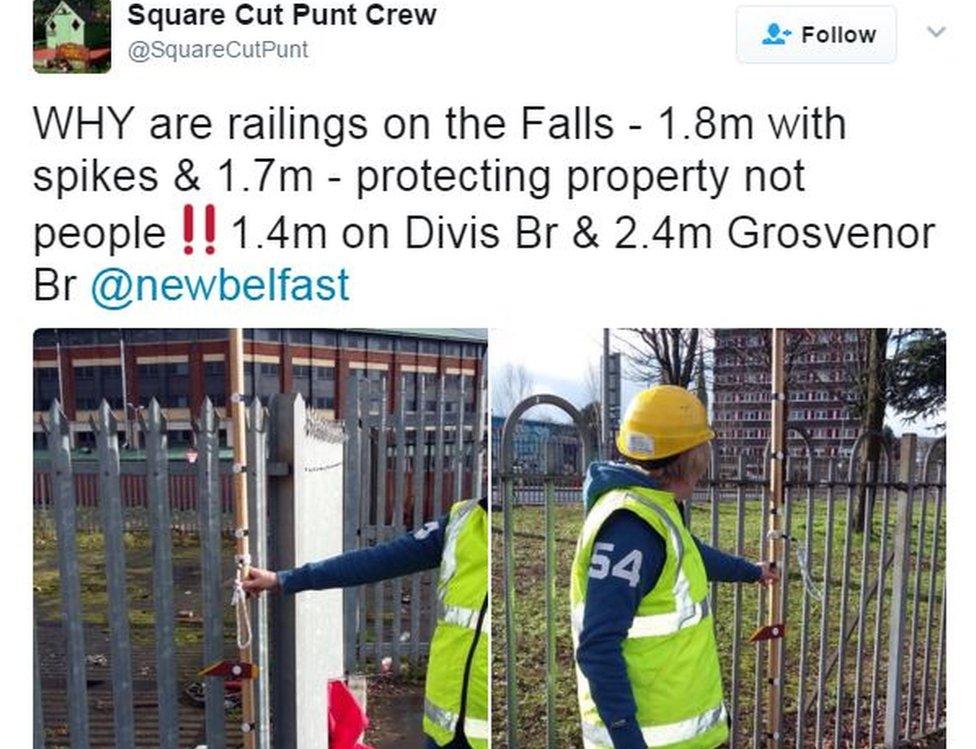Call for suicide-prevention barriers at Belfast bridge
- Published

Tiarna Dorton, pictured after she attempted suicide, is sharing her story in an effort to improve safety measures
"If I went there that night and it had have been more difficult, 100%, I wouldn't have tried anything."
It was less than three years ago that Tiarna Dorton tried to take her own life by jumping from a road bridge onto Belfast's Westlink.
"I can remember the smell of the tarmac. It had been raining," she told BBC News NI.
The attempt caused serious injuries and she now uses a wheelchair. But she has come out the other side, in her words, in a better place.
Now, she's sharing her story in an effort to improve safety measures at the Divis Bridge.
On Thursday, a local group walked to the bridge from Grosvenor Bridge as part of a call for higher barriers.
If those had have been in place when Tiarna tried to take her own life, she said she would have turned away.
"I'm not much of a climber, it would have put me off," she said.
"People might say that if they're going to do it, they're going to do it.
"But if it had have been a bit of a struggle to do it, then I might have been more inclined to talk to someone instead."
'Can't wait any longer'
The group behind Thursday's campaign event were the Square Cut Punt Crew, a local support group made up of people touched by issues such as homelessness, addiction and mental health problems.
The organisers are hoping the Department of Infrastructure will be moved to take action.

Members of the Square Cut Punt Crew say higher barriers exist in the area than those on the bridge
"We're lobbying for the department's permanent secretary, Peter May, to make a decision to raise the railings," said Alison Brennen.
The reasons for an individual attempting to take their own life are complex, but Northern Ireland has a higher rate of suicide than anywhere else in the UK.
In 2015, the rate of suicide in Northern Ireland was 19.3 deaths per 100,000 of the population - the highest on record, according to the Office of National Statistics.
These rates are even more severely felt in areas like the lower Falls Road, near Divis Bridge.
Square Cut Punt Crew began their campaign after the death of Nathan Ritchie last October.
A petition they started has gained more than 1,000 signatures.
"With Stormont being up in the air since January, we haven't been able to push," said Alison. "But we can't wait any longer.
"If there was something there, just to distract people, it would make things a wee bit more difficult."
The group pointed out that a draft strategy issued by the Department of Health, external - Protect Life 2 - specifically cites the use of "physical barriers" at well-known locations as an effective method in suicide prevention.
They also argued that barriers exist elsewhere in the area to protect property or prevent anti-social behaviour.
"Railings around bins in the area are even higher than those on the Divis Bridge," said group member Francine Trainor.
"In the past year spiked railings have been put up to stop bonfires being lit, but nothing has been done to stop people jumping off the bridge and losing their lives."
'Too easy'
The Department of Infrastructure has said the bridge meets national standards, including the height requirements of the "bridge parapets".
"While engineering solutions may provide part of the answer by restricting access, in isolation they may not address the underlying problem and have the potential to reinforce the association of bridges with suicide attempts," it said.
However, it also said that it worked with other agencies to facilitate the introduction of measures at sites "identified as particularly problematic" and that "consideration is already being given to the Westlink corridor".
For Tiarna Dorton, these measures are badly needed.
"There was nothing put in place at the bridge to stop me," she said.
Despite the extensive injuries - including a broken spine and legs - Tiarna said the incident was key in turning her life around.
"Back then I was putting myself into a lot of vulnerable situations," she said.
"I realised since that I care much more about myself. That a lot of people care about me."
'Do something about this bridge'
However, she has her concerns that others may feel like she did on that night in 2014 and that they will go to the same place.
According to Alison Brennen, Tiarna's experience is a familiar one.
"I've heard similar stories before - her story is probably the same as many people's who go to that bridge," she said.
"If you can just stop somebody for 30 seconds, they might reconsider.
"We're a group that lives locally who have experienced issues like this.
"We just think it makes sense to do something about this bridge."